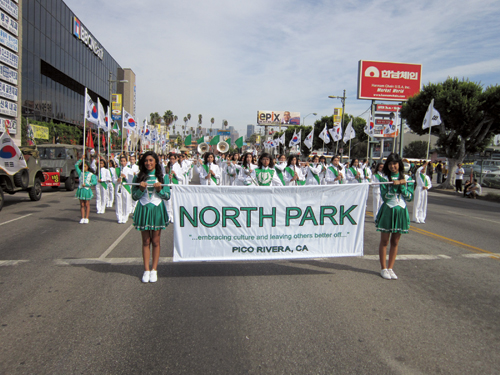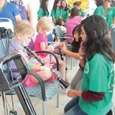In the midst of many years of continued success in the band competition arena I would have never dreamed that a time would come that my North Park Middle School Band, from Pico Rivera, California would be so completely transformed from a fierce competitor to a joyful organization that focuses on helping the community.
For years my teaching career was any competitive director’s dream. The band went on a 15-year streak of undefeated middle school parade and concert competitions, and the ensembles never received less than a superior rating in a concert festival. In 1997 North Park became the first and only middle school band to ever march in the Pasadena Tournament of Roses Parade and also performed in Carnegie Hall four times.
Despite this success, something was tugging at my heart. I sensed that I could still make a more positive difference through music education. True, the success of the program was a source of pride in the community, and the shelves in the music room overflowed with shining trophies. I was teaching to what I thought was the best of my ability, but I still felt that I was not doing enough.
In a surprising turn of events I eliminated all forms of competition and instituted the following programs: Social Outreach, Cultural Outreach, and Kids Helping Kids. Surprisingly, there was absolutely no resistance of any kind from students, parents, or administration, to these changes.
Social Outreach
The Social Outreach program entails a busy schedule of concerts in shelters for homeless women and children, senior centers, assisted living homes, Veterans homes, a center for the blind, and children’s hospitals. Concerts are always interactive. At children’s hospitals and shelters, we include music that calls for toy instruments. After performing the song some of the students walk into the audience and bring up volunteers who join the band in another performance of the song. Some perform from hospital beds. When the concert is for adults, such as in an assisted living home or Veteran’s home, we include them in sing-alongs of songs such as America the Beautiful, God Bless America, and Silent Night.
Outreach concerts have evolved to become completely run by students. They take turns announcing and conducting the selections and even assume administrative tasks such as checking in at the reception desk. At a Veteran’s nursing home when an 8th grade boy thanked the Veterans for their service one of the patients said in a broken, tearful voice that, “after meeting you young people we all know that our service was worth it.” When it was time for us to leave, the patients made the nurses push their wheelchairs to the parking lot where they saluted our bus as we drove away.
Every year we have an event called Senior Day. Students are divided into four small bands that each travel to an assisted living home. Simultaneously, at precisely 5 pm, student ensembles perform concerts at all four centers. Afterwards we hold a barbecue and group discussion back at school. Although some school bands have engaged in similar concerts, it is usually choruses that do these types of performances.
A point that is always made by the directors of these institutions is that what sets our concerts apart from others is that we stay after the performance and mingle with the audience. This is a very important part that always makes our visits unforgettable. In hospitals students remove the mouthpieces and allow patients to touch the instruments. In Veteran’s homes there are impromptu private performances for wheelchair bound Veterans. In a center for the blind, students guide audience members’ hands to feel and explore the instruments. All students are required to turn in a one-page paper describing their experiences and feelings after every outreach concert. There is always a group discussion in which students can share their thoughts.
Cultural Outreach
Although we have eliminated band competitions I still believe that marching band is a good experience because it is a part of American culture. We continue to march in parades, but only in those that celebrate different cultures. When an adjudication stand is present I always send a note stating that we do not want to be evaluated. Instead, these events are now an opportunity to learn about other cultures.
For example, in preparation for a local Korean parade students worked in groups of four to research topics on language, food, clothing, and music and created poster boards to share the information. We went to Korean barbecue restaurant for lunch and advanced students learned to play the South Korean National Anthem, while intermediate students lined the band on all sides and carried Korean flags. As the students marched, the crowd sang along with the band.

Kids Helping Kids
My life changed when I started taking band students to teach music lessons in a homeless shelter in 2005. While it was obviously meaningful to the children at the shelter, I could also see personal and musical growth in my students as they became teachers. The program was highly successful and when we traveled to New York City in 2007 for our third Carnegie Hall concert, six homeless children joined us and performed in the concert. The North Park students not only completely taught the homeless children, but they also raised all of the funds needed for the tour.
We now have a program in a local children’s hospital in which the students teach recorders to hospital patients who are receiving artificial limbs. We have programs in a homeless shelter and also in a facility for abused children in which the North Park students teach band instruments. The outreach students are frequently included in our parades and concerts.
Everything in the Kids Helping Kids program is funded by the students, who voluntarily form bake sale teams. In 2011 they raised all the money for a young girl from Haiti, who had lost her left leg in the earthquake, to travel to California and join our band in a parade at Disneyland.
To a Better Society
Marching band is a part of American culture, and band competitions are here to stay. Band competitions are clearly win-lose activities. A band wins at the expense of another and no matter how well a director may sugar-coat a loss, a win is a win, and a loss is a loss. This is expected in sports activities, but perhaps competitions are not the best purpose of music education, especially when directors become overly concerned with winning. Such directors invariably make performance decisions that they would not otherwise make, and those decisions are often painful to students who do not achieve as highly as others. I have frequently observed directors pulling under-performing kids out of their parade block at the competition line. This practice is humiliating to the student, and disappointing to their family, friends, and the audience, and the memory lasts a lifetime. It places the desire to win above the heart of the student.
On the other hand a music outreach project is a 100 percent win-win activity. It celebrates the beauty of others while the inner beauty of each student radiates like a beacon of hope. By learning to use their musical talents for the good of others, students become instilled with a sense of purpose and unselfish love. I teach my students every day that we should strive to leave others better off than they were when we first met. Moment by moment, day by day. The trophies of the North Park Middle School Band are the students, their families, and the community.
I believe that the future of music education in each community will depend not on which awards the program has collected, but on the community’s positive experience with the program. It is the inherent responsibility of every educator in the United States of America, from every discipline, from every subject, and at all levels from elementary to college, to stand up for and to instill the values and integrity that will build a more firm foundation of peace, freedom, and justice in our communities and in our nation.





